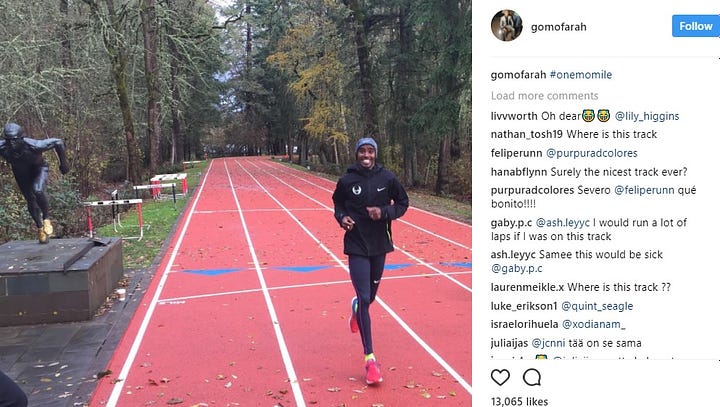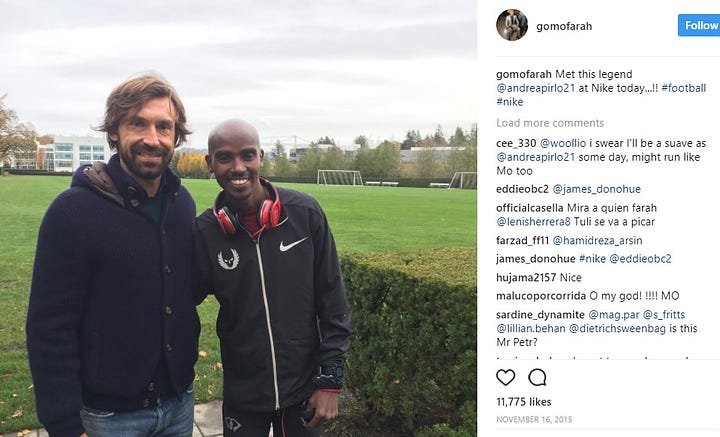Sir Mo Farah's running partner filmed buying EPO in Kenya
Exclusive: Old footage has emerged of Sir Mo Farah training alone with a pacemaker, who was later caught buying the drug EPO, in the Kenyan Highlands.
It takes considerable time and effort to run this newsletter, and paid subscriptions help greatly. If you would like a group subscription for your organisation please reach out directly at honestsport@substack.com.
Thank you to those of you who have decided to subscribe already.
Help grow this newsletter by sharing it with friends, athletes or colleagues, particularly anti-doping officials, journalists or sports lawyers, who you think would find it useful or interesting. Thank you, Edmund!
The village of Iten in Western Kenya is as an almost mythical running town that has produced a catalogue of world class Kenyan athletes from David Rudisha to Wilson Kipketer. The high-altitude conditions in the Kenyan Highlands and the village’s obsessive love for running is said to provide an unparalleled environment for distance running. In July 2016, undercover investigation exposed another side to Iten – the shady underworld of performance-enhancing drugs.
Honest Sport can reveal that the pacemaker who led these journalists on a tour of the area’s doping doctors was one of Sir Mo Farah’s running partners in 2013 and 2014. This pacemaker, Frederick Lemishen Ngoyoni, was filmed buying the blood doping drug EPO. His doctor, who has since been arrested by Kenyan police, named three British athletes, whose identities are unknown, he claimed to have supplied with EPO.
During the BBC’s visit to Iten, Cram asked Farah why he chooses to train with someone like Freddie on a “regular basis” rather than the whole host of elite athletes based in the area.
“I like to do my own thing…Freddie is a really nice guy. He will come twenty minutes, half an hour before and he will do some stretching and wait for me no matter what. Even if I am running late and everything else”, Farah explains.
Impressed by his character, Farah also commends the Kenyan’s recuperative abilities.
“We go out on a run and Freddie will get dropped and then you know normally when someone gets dropped they will get tired the next day. No he will come back again. He keeps coming back, keeps coming back”, the quadruple Olympic champion describes.
In September 2013, Farah reminisced about the period training in Iten. In a Facebook post, captioned “Miss training in Kenya”, a beaming Farah runs alongside Freddie. A few months later their association continues. In February 2014, another picture of the pair – this time Freddie sports a Team GB jersey.


In an NTV Kenya video profile of Freddie’s life as a pacemaker he details his relationship with Farah, “I’m grateful to God as Farah has given me the morale and hope to start running a fresh after many injuries before. If all goes well, this year and the following year, I will be his pacemaker to help him break records”.
Despite coming across as a committed young athlete in the BBC and NTV footage, the ARD/ Sunday Times documentary, filmed in 2015, was not so kind. Freddie was secretly filmed buying EPO from a pharmacist. His personal doctor Dr. Joseph Mwangi offered journalists vials of EPO.
Freddie had been put on a “program” by Dr. Mwangi and expected to see a “big change” in performance. Since the airing of the documentary, Freddie admits his relationship with the doctor dates back to 2012.
In more serious revelations, Dr. Mwangi alleged to have put three British athletes on an “EPO program”, amongst a wider group of fifty athletes. Similar claims were voiced by Dr. Samson Talei, from St. Luke’s Hospital in Eldoret, and recommended by Mwangi.
Dr. Talei exhibited, on camera, the blood paperwork of a British athlete he claimed to have administered EPO to. The same athlete would “come and go” to avoid drug testers in the region he said.

While there is no suggestion of wrongdoing on behalf of Sir Mo Farah nor that he is one of the unnamed British athletes, Honest Sport has made several attempts to discover the identity of these three British athletes. UK Anti-doping (UKAD) sent two investigators to Iten after the Sunday Times/ARD documentary was aired, to establish the validity of the doctors’ claims.
Honest Sport, under the Freedom of Information Act, requested UKAD provide the names of these athletes as well as any intelligence they had amassed on Dr. Mwangi and Dr. Talei. Unsurprisingly, due to privacy concerns, such requests were not met. UKAD refused to even acknowledge the identity of the doping doctors – information that is public knowledge. In the ARD/Sunday Times documentary they are shown in full on camera and referred to by name. UKAD state its investigation is still ongoing.
Honest Sport was however informed by the coach of a Kenyan Olympian that Dr. Joseph Mwangi and Dr. Samson Talei were well known doping doctors in the Kenyan Highlands before their arrests by Kenyan police.
Sir Mo Farah cannot be held accountable for the actions of his training partner but such associations are surely unwelcome for Farah at a time when his coach Alberto Salazar is under investigation by the United-States Anti-Doping Agency (USADA) and the FBI for alleged anti-doping violations.
Frederick Lemishen Ngoyoni is not a professional athlete, he is simply a pacemaker. One has to wonder how unsavoury an environment Farah found himself in when training in Iten, if an amateur athlete such as Freddie, grateful to simply train with elite athletes, could so easily obtain EPO. In this same environment, Farah has also overlapped with disgraced coach Jama Aden in 2009.
Jama Aden, coach of 1500m world-record holder and Ethiopian poster girl Genzebe Dibaba, was arrested at a hotel near Aden’s training base in Sabadell, Spain in 2016. The Spanish Police, acting after the completion of a three-year investigation, raided the hotel, where Aden and his athletes were staying, and found EPO and syringes in the room of one of Aden’s physiotherapists.
The Spanish media reported police seeing Aden dispose of used needles in rubbish bins outside the hotel, which he later claimed were “injections that I use for myself.”
British Athletics acknowledged that Aden was an “unofficial facilitator” for a group of British athletes, including Farah, in Sululta, Ethiopia, for a week in 2015.
Aden’s job was to hold “a stopwatch and shout out times to athletes as they completed their track sessions. There was no coaching or anything technical involved” the athletics association underlined.
On the evening of Farah’s 10,000m gold medal run at the 2016 Rio Olympics, Farah alluded to the fact that he neither knew Aden well nor had trained with him. However, a different narrative soon emerged. The source? Farah’s own autobiography Twin Ambitions.
Before his breakthrough to the summit of middle distance running, Farah was advised by Aden while training in Iten, Kenya, in 2009. In Farah’s own words, It was during these sessions that Farah realised “what the guys under Jama and Renato (Canova) were doing was different” from his own training programme at the time.
“Renato Canova wasn’t the only one dispensing advice to me in Iten. At the same time I would join in on the odd session with guys coached by Jama Aden.” Farah described. “Like me, Jama was born in Somalia and we had known each other for years.” Quite a different standpoint from his future denials.
While there is no suggestion of any wrongdoing by Sir Mo Farah or that he is one of the British athletes mentioned by Dr. Mwangi and Dr. Talei, his association with individuals who are a potential threat to clean sport continue. Rather than severing ties with coach Alberto Salazar in the face of serious doping accusations in 2015, he has instead chosen to continue their relationship, despite not taking him to the 2017 World Championships in London.
After making the decision to stand by Salazar, Farah’s faith has yet to be rewarded. Salazar is currently under investigation by USADA and alarmingly the FBI.
According to a USADA report, it is “highly likely” Galen Rupp, who trains with Farah at the Nike Oregon Project under Salazar, received an L-carnitine infusion “in violation of the applicable anti-doping rules”.
In a recent leak by the Russian hacking group Fancy Bears the International Association of Athletics Federation (IAAF) reported anomalies in Farah’s biological blood passport while he was seemingly training at the Salazar-run Nike Oregon Project. There were apparently similar issues with Rupp’s passport four days after competing in his first ever marathon in February 2016.
An athlete’s biological passport is important because it helps to detect doping violations by delineating variances in an athlete’s blood profile.
A leaked email from the IAAF Medical Manager Pierre Yves-Garnier, details how he and an athlete biological passport expert panel had marked Farah’s profile as “Likely doping; passport suspicious” on 23rd Novemeber 2015. Farah’s passport returned to “normal” levels four months later. It is important to stress the term “likely doping” came from officials at the IAAF.
Judging by his social media activities, he was training at the Salazar-run Nike Oregon Project at the time. On 16th November Farah is pictured at the Nike headquarters in Oregon with footballer Andrea Pirlo. On 28th November, Farah uploads a photo with his daughter at his home in Portland Oregon and on 4th December Farah trained at the Nike Oregon Project at Nike’s headquarters.


While there is no proof of any wrongdoing by Sir Mo Farah, Farah has decided against publicly discussing the “IAAF quoted” issue with his blood profile. When Paula Radcliffe faced a similar issue in 2015, she gave reasons why three of her blood samples were allegedly suspicious. Farah has been less forthcoming. Instead he claims journalists have made “something out of nothing”.
When journalist Tom Roddy interviewed Farah for the premiere of his new film “One Mo Mile” in December last year, questions concerning Alberto Salazar were forbidden. In the lead up to the ongoing 2017 World Athletics Championships Farah, on the advice of his PR team, refused to speak to members of the media.
As Farah continues to face pressing questions in the media, one wishes he would be more forthcoming with his answers. Sir Mo Farah has never failed a drug test, and if he is serious about promoting clean sport, one has to hope the British icon and quadruple Olympic Champion severs his currents ties to individuals who are a potential danger to athletics. His training sessions with a pacemaker caught buying EPO, whose actions he is not responsible for, come as another unfortunate association.





